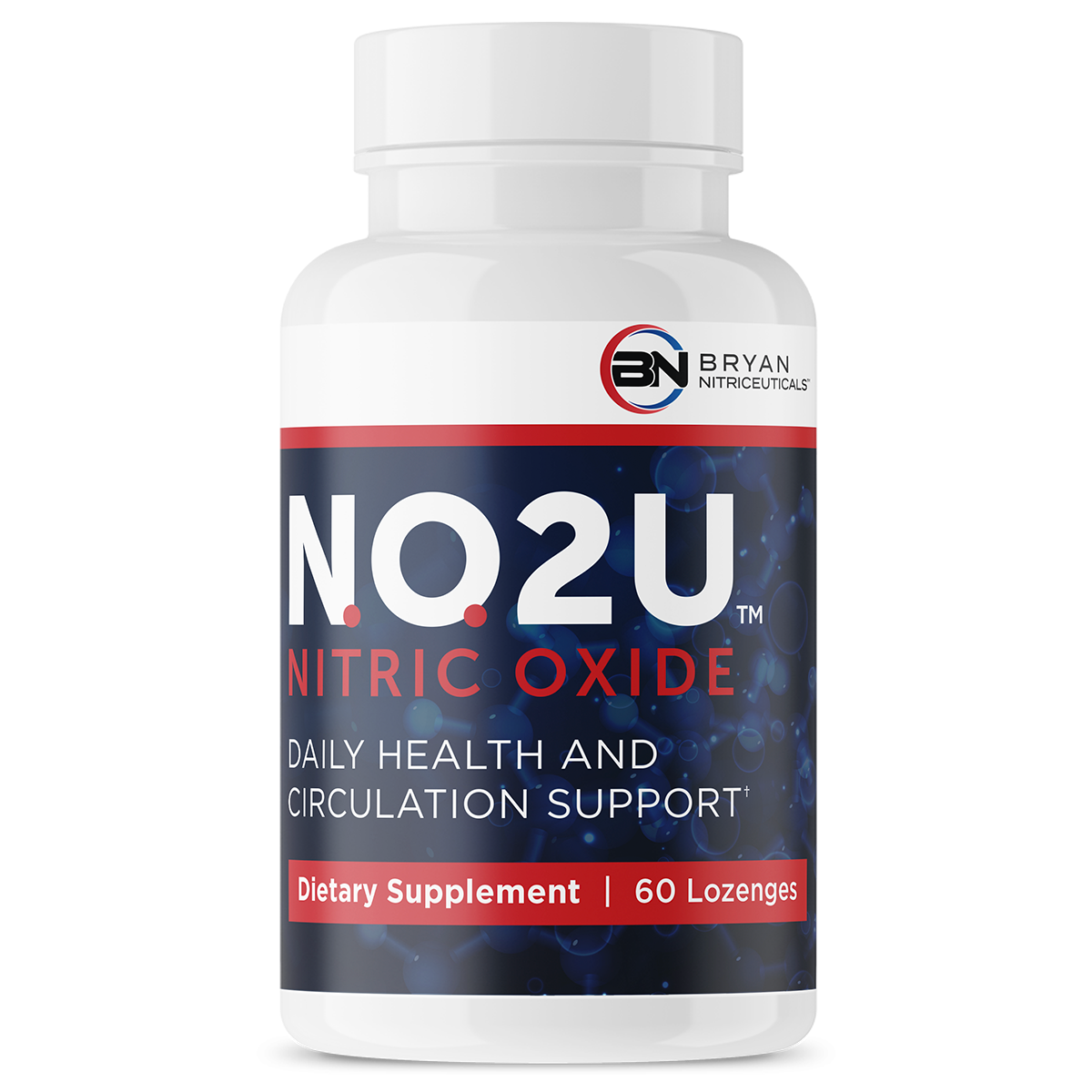Understanding the Impact of Nitric Oxide on Blood Pressure Management

By Alyssa Seidler
November 18, 2024
What is Nitric Oxide?
Nitric oxide is a molecule that plays a crucial role in various bodily functions, including blood pressure regulation. So it is important to work on understanding the impact of nitric oxide on blood pressure management and also how else it impacts the body.
It is produced naturally by the human body and is one of the most important molecules for blood vessel health. Taking nitric oxide supplements can support the body’s natural production of nitric oxide, enhancing blood vessel health by reducing arterial stiffness and blood pressure.
Nitric oxide is involved in many cell processes, including the widening of blood vessels, or vasodilation.

The Role of Nitric Oxide in Blood Pressure Regulation
Nitric oxide plays a vital role in blood pressure regulation by helping to relax and widen blood vessels, which enhances blood flow and reduces overall blood pressure levels.
This molecule functions as a chemical messenger in the cardiovascular system, sending signals to the smooth muscle cells in blood vessel walls to relax and dilate.
This relaxation, or vasodilation, lowers the resistance within the blood vessels, facilitating easier blood flow and ultimately reducing the heart’s workload.
Moreover, nitric oxide is essential for maintaining endothelial function. The endothelium, the thin layer of cells lining blood vessels, relies on nitric oxide to manage vascular tone, prevent excessive clot formation, and combat inflammation.
When endothelial function is compromised, it can lead to conditions like hypertension and atherosclerosis. By supporting the endothelium, nitric oxide not only aids in blood pressure control but also promotes overall vascular health, helping to prevent the progression of cardiovascular disease.
Furthermore, nitric oxide production can be influenced by lifestyle factors, such as diet and exercise. Foods rich in nitrates—such as leafy greens, beets, and certain fruits—can boost nitric oxide levels, as can regular physical activity.
These positive habits enhance nitric oxide availability in the body, providing a natural means of supporting blood pressure and cardiovascular health.

Factors that Affect Nitric Oxide Production
Nitric oxide production in the body is influenced by several key factors, including diet, physical activity, and specific nutrients. A diet rich in fruits and vegetables, especially those high in nitrates like leafy greens, beets, and citrus fruits, can significantly boost nitric oxide levels.
Nitrate-rich foods are converted into nitric oxide through a complex pathway in the body, ultimately leading to improved blood vessel function and circulation.
Exercise and physical activity also play a crucial role in nitric oxide production. When we engage in aerobic activities like walking, running, or cycling, blood flow increases, which stimulates the endothelial cells lining our blood vessels to release more nitric oxide.
This increase helps to dilate blood vessels, allowing oxygen-rich blood to flow more freely, improving overall cardiovascular health.
Additionally, certain amino acids, such as L-arginine and L-citrulline, have been shown to enhance nitric oxide production. L-arginine, found in foods like nuts, seeds, and fish, serves as a direct precursor to nitric oxide.
Meanwhile, L-citrulline, found in watermelon and other foods, is converted into L-arginine in the kidneys, which then contributes to nitric oxide synthesis.
These amino acids are often available in supplement form as well, and research suggests they can support nitric oxide production and vascular health, particularly when dietary sources are limited.
Other factors, such as maintaining a healthy weight and managing stress, can also positively impact nitric oxide production.
Conversely, habits like smoking and excessive alcohol consumption can impair endothelial function, reducing the body’s ability to produce nitric oxide. By adopting a lifestyle that promotes nitric oxide production, individuals can support their cardiovascular health and overall well-being.

Dietary Sources of Nitric Oxide Precursors
A well-balanced diet plays a crucial role in supporting nitric oxide production in the body, which is essential for maintaining healthy blood pressure levels. Incorporating certain foods into your diet can help boost nitric oxide levels naturally, and can better help you with understanding the impact of nitric oxide on blood pressure management. Here are some of the richest sources of nitric oxide precursors:
- Leafy Greens: Vegetables like spinach, kale, and collard greens are packed with nitrates, which the body converts into nitric oxide. These greens are not only great for nitric oxide production but also offer a host of other health benefits.
- Beets: Beets are renowned for their high nitrate content. Consuming beets or beetroot juice can significantly enhance nitric oxide production, promoting better blood flow and lower blood pressure.
- Citrus Fruits: Oranges, grapefruits, and lemons are excellent sources of vitamin C, which supports nitric oxide production. Including these fruits in your diet can help maintain healthy blood vessels.
- Berries: Strawberries, blueberries, and raspberries are rich in antioxidants and flavonoids, which aid in nitric oxide production and protect against oxidative stress.
- Fatty Fish: Fish like salmon, tuna, and mackerel are high in omega-3 fatty acids, which support nitric oxide production and improve cardiovascular health.
- Avocados: Avocados are a great source of potassium, which helps regulate blood pressure and supports nitric oxide production.
- Tomatoes: Rich in lycopene, tomatoes can help boost nitric oxide levels and support overall heart health.
- Whole Grains: Foods like brown rice, quinoa, and whole wheat are high in fiber, which supports nitric oxide production and promotes healthy blood pressure levels.
Incorporating these foods into your daily diet can help enhance nitric oxide production, leading to better blood pressure management and overall cardiovascular health.
Boosting Nitric Oxide Production for High Blood Pressure
Boosting nitric oxide production can benefit those with high blood pressure. Supplements like L-arginine and L-citrulline support nitric oxide levels, potentially aiding in blood pressure reduction.
Additionally, nitrate-rich foods such as leafy greens and beets help naturally increase nitric oxide in the body, promoting better vascular health. Beetroot juice supplements are also effective, offering an easy way to raise nitric oxide levels and contribute to blood pressure management.

Pharmacological Interventions to Enhance Nitric Oxide
In addition to dietary changes, pharmacological interventions can play a significant role in enhancing nitric oxide production in the body.
These interventions can be particularly beneficial for individuals with high blood pressure or other cardiovascular conditions. Here are some common pharmacological options:
- Nitric Oxide Supplements: These supplements are designed to increase nitric oxide levels in the body. They can be taken orally and are often used to support cardiovascular health and improve blood flow.
- L-Arginine Supplements: L-arginine is an amino acid that the body converts into nitric oxide. Taking L-arginine supplements can help boost nitric oxide production, leading to improved blood vessel function and lower blood pressure.
- L-Citrulline Supplements: Another amino acid, L-citrulline, is also converted into nitric oxide in the body. L-citrulline supplements can enhance nitric oxide production and support cardiovascular health.
- Nitrate Supplements: These supplements provide a direct source of nitrates, which the body can convert into nitric oxide. They are often used to improve blood flow and reduce blood pressure.
While these supplements can be effective in boosting nitric oxide levels, it’s important to consult with a healthcare professional before starting any new supplement regimen. This ensures that the supplements are safe and appropriate for your individual health needs.

Lifestyle Modifications to Support Nitric Oxide Levels
Making certain lifestyle modifications can significantly support nitric oxide levels in the body, contributing to better blood pressure management and overall health. Here are some effective lifestyle changes to consider:
- Exercise Regularly: Physical activity is one of the most effective ways to boost nitric oxide production. Regular exercise helps improve blood flow and supports healthy blood vessels. Aim for at least 30 minutes of moderate exercise most days of the week.
- Quit Smoking: Smoking can damage blood vessels and reduce nitric oxide production. Quitting smoking can help restore nitric oxide levels and improve cardiovascular health.
- Reduce Stress: Chronic stress can negatively impact nitric oxide production. Incorporating stress-reducing techniques such as meditation, yoga, or deep breathing exercises can help maintain healthy nitric oxide levels.
- Get Enough Sleep: Adequate sleep is essential for overall health and nitric oxide production. Aim for 7-8 hours of quality sleep each night to support your body’s natural processes.
- Maintain a Healthy Weight: Being overweight can negatively affect nitric oxide production and blood pressure. Maintaining a healthy weight through a balanced diet and regular exercise can support nitric oxide levels and overall cardiovascular health.
By incorporating these lifestyle changes, you can naturally enhance nitric oxide production, leading to better blood pressure management and improved overall health.
The Relationship Between Nitric Oxide and Endothelial Function
Nitric oxide (NO) plays a crucial role in improving endothelial function, which is essential for maintaining healthy and properly functioning blood vessels. The endothelium, the thin layer of cells lining the blood vessels, relies on NO to regulate vascular tone, promote blood flow, and support cardiovascular health.
In individuals with high blood pressure, endothelial dysfunction is a common condition that impairs the ability of blood vessels to relax and dilate. By boosting NO levels, supplements and lifestyle changes can help restore endothelial function, improving blood flow and reducing vascular strain.
Additionally, NO helps to reduce inflammation and oxidative stress, both of which are significant contributors to endothelial dysfunction. By mitigating these damaging processes, nitric oxide supports the health and resilience of blood vessels, offering a potential pathway for better blood pressure management and overall cardiovascular health.
Comparative Analysis of Nitric Oxide with Other Blood Pressure Regulators
Nitric oxide stands out as a potent and natural blood pressure regulator, offering several advantages over traditional blood pressure medications. Here’s a comparative analysis of nitric oxide and other common blood pressure regulators:
- Natural Origin: Unlike many synthetic blood pressure medications, nitric oxide is a molecule naturally produced by the body. This natural origin can make it a more appealing option for those looking to manage blood pressure without synthetic drugs.
- Rapid Onset of Action: Nitric oxide has a quick onset of action, meaning it can start working to lower blood pressure relatively quickly. This is beneficial for individuals who need immediate blood pressure control.
- Longer Duration of Action: Nitric oxide can have a longer-lasting effect compared to some other blood pressure medications, which may require more frequent dosing.
- Lower Risk of Side Effects: Traditional blood pressure medications can come with a range of side effects, from dizziness to kidney issues. Nitric oxide, being a natural molecule, generally has a lower risk of adverse effects, making it a safer option for many patients.
Overall, nitric oxide is a powerful blood pressure regulator that offers a natural, effective, and safer alternative to traditional blood pressure medications.
Its ability to quickly and sustainably lower blood pressure makes it an attractive option for hypertensive patients looking for a holistic approach to blood pressure management.

Study Findings on Nitric Oxide and Blood Pressure Management
Research indicates that nitric oxide supplements can lower blood pressure in individuals with hypertension. One study showed that a nitric oxide-releasing lozenge significantly reduced both systolic and diastolic blood pressure in hypertensive patients.
Another study found that L-arginine supplements improved endothelial function, leading to lower blood pressure in those with high blood pressure.
Frequently Asked Questions
Does nitrous oxide affect your blood pressure?
Nitrous oxide, commonly used as an anesthetic, can impact blood pressure by causing a temporary drop due to its sedative effects. However, it’s different from nitric oxide, which directly affects blood vessels and blood pressure regulation.
Does a nitric oxide dump lower blood pressure?
Yes, nitric oxide dumps—brief bursts of exercise designed to release nitric oxide—can help lower blood pressure by increasing blood flow and encouraging blood vessel dilation.
Does nitric oxide affect heart rate?
Nitric oxide primarily impacts blood vessel dilation, which can indirectly influence heart rate. By reducing vascular resistance, it may allow the heart to work more efficiently, potentially leading to a lower heart rate.
Does nitric oxide give you a hard on?
Yes, nitric oxide plays a key role in erectile function by relaxing blood vessels in the penis, which increases blood flow and facilitates erections. Many erectile dysfunction treatments work by enhancing nitric oxide’s effects in this process.
Understanding the Impact of Nitric Oxide on Blood Pressure Management Conclusion
Nitric oxide (NO) is a cornerstone of effective blood pressure management, playing a pivotal role in maintaining vascular health, regulating blood flow, and supporting overall cardiovascular function. Its ability to promote vasodilation, enhance endothelial function, and reduce oxidative stress makes it a vital molecule in the fight against hypertension and related conditions.
By incorporating lifestyle modifications such as regular exercise, a nitrate-rich diet, and targeted supplementation, individuals can naturally boost nitric oxide levels, improving blood vessel function and reducing the risk of cardiovascular disease. Emerging therapies and pharmacological interventions further highlight the importance of nitric oxide in modern medicine, offering innovative solutions for those seeking better blood pressure control.
Understanding and harnessing the power of nitric oxide provides a holistic and effective approach to managing blood pressure and promoting lifelong cardiovascular health.
